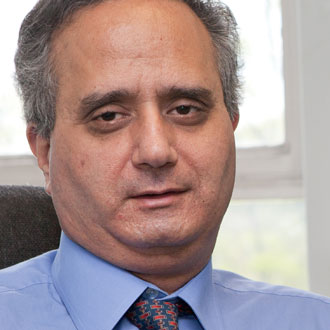We are employing a pharmacist to help with treatment reviews and minor acute illness, but some patients are reluctant to see him. Receptionists report that patients are requesting appointments with ‘a proper doctor’ instead. How do we respond?

Dr David Evans: Highlight that the pharmacist can see them sooner
Patients are understandably concerned and unsure about the pharmacist as a new member of the general practice team. All practice staff, including receptionists and GPs, have a role to play in educating patients about the skills and experience the pharmacist brings.
When the pharmacist starts, you could do a workshop in the practice where the receptionists, pharmacists and the GPs role-play what would happen in reception to prepare the receptionist for advising patients.
Receptionists can then inform patients that their practice pharmacist is well qualified to manage common ailments and is able to prescribe when appropriate. Patients, of course, can choose to see their GP, but it may help to advise them that the pharmacist can probably see them sooner and the pharmacist can request an urgent appointment with the GP if necessary.
Another key message is that the pharmacist’s contribution means the GPs’ time will be freed up so that when a doctor’s expertise is needed it will be available to all patients in a timelier manner. NHS England has produced a leaflet for patients to help explain the pharmacist’s role in general practice. Engagement with patient partnership groups, messages on prescription counterfoils and articles in newsletters can all assist with integration of the pharmacist.
Over time, as more patients consult the pharmacist for medication reviews and minor illness treatment, understanding of the role will improve as it has for nurse practitioners. Practice pharmacists will soon prove their value to both patients and practices.
Dr David Evans is a GP in Ealing, west London, leading the pharmacist pilot there with Dr Graham Stretch, a pharmacist in Ealing who contributed to the piece

Rena Amin: Promote the pharmacist as a qualified professional
Practice staff and referring GPs can allay these concerns by informing patients that the GP is still the responsible doctor and pharmacists have different expertise.
GPs and reception staff can use a range of resources to promote this role. These can be a practice leaflet, a poster in the waiting room, the practice website and communications with the patient participation group. Patient concerns should be heard but patients have to be educated that a pharmacist is a qualified healthcare professional and is part of the team to address their health needs. Patients do have a choice to see a healthcare professional of their choice, but they also have to accept that GPs and practice nurses will refer patients they feel need a pharmacist’s consultation for medicine optimisation, diagnostic benefit and polypharmacy issues. You can explain that this is like the situation when a patient is referred to a hospital and may see a consultant, a registrar, a specialist nurse or a physiotherapist.
If after all the explanations, a patient refuses, the practice has to accept that decision, but hopefully as the role gets established, other patients who have embraced the new service will become advocates to change perceptions.
Rena Amin is a practice pharmacist and partner in a GP practice in Croydon, south London

Dr David Mummery: Emphasise that pharmacists will speak to a GP if necessary
If patients show reluctance to consult with a pharmacist, receptionists should explain that pharmacists are highly trained in medication and treatment reviews, have a high level of expertise, and have had further training and experience in minor illness.
It should also be emphasised to patients that the pharmacist will be able to speak to one of the doctors at any time during the consultation if they need a GP’s advice. It may also be useful to have a website page and leaflet or poster in practice, explaining what types of problems pharmacists can deal with and how they are supported by GPs.
It’s important to use the pharmacist’s skills correctly. Ideally they should only see patients with problems that they are confident to deal with, and not where they are out of their depth – for instance, patients who clearly need urgent medical attention and hospital assessment, with symptoms such as severe chest pains or shortness of breath.
There should be a system to give the pharmacist access to the practice’s on-call GP throughout their sessions, so they can seek advice at short notice. If despite these reassurances a patient still declines to have a pharmacist appointment, this should be respected. However, providing clear information and explaining the high-level expertise pharmacists have should hopefully allay the worries of most patients.
Dr David Mummery is co-vice-chair of Hammersmith and Fulham LMC and a GP in west London

Professor Azeem Majeed: Brief staff about the pharmacist’s role
To overcome this resistance, it is essential that all staff are briefed about the role of the pharmacist and what to say to patients who express concerns about seeing him. This process should start before the pharmacist is in post, as should a discussion of the role of the pharmacist with the practice’s Patient Participation Group. The staff briefing should reinforce certain points: that pharmacists are highly trained professionals (and pharmacists working in primary care will have undergone additional training such as an Independent Prescribing Course), that by taking on work such as medication reviews and the management of minor illnesses pharmacists can allow doctors to spend more time with complex patients, and that pharmacists can always seek advice from a doctor when needed. You could also include this information on your practice website, in any induction pack given to new patients and in your practice newsletter.
If some patients remain reluctant to see a pharmacist, they could speak to a more senior member of the practice team such as the practice manager or deputy manager. If however a patient remains unconvinced by these explanations, I would let them see a doctor. Attitudes towards pharmacists will change over time and patients will eventually come to understand that they are highly skilled professionals who have a valuable role to play in primary care.
Professor Azeem Majeed is a GP in Lambeth and head of the primary care and public health department at Imperial College London

















